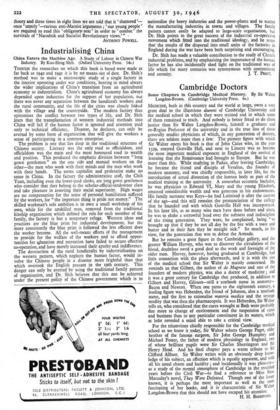Industrialising China
China Enters the Machine Age. A Study of Labour in Chinese War Industry. By Kuo-Heng Shih. (Oxford University Press. 14s.) THOUGH the researches on which this book is based were made as far back as 1940 and 1941 it is by no means out of date. Dr. Shih's method was to make a microscopic study of a single factory in the interior operating under war conditions, bearing in mind always the wider implications of China's transition from an agricultural economy to industrialism. China's agricultural economy has always depended upon industries for the support of her population, out there was never any separation between the handicraft workers and the rural community, and the life of the cities was closely linked with the village and the countryside. The modern factory thus epitomises the conflict between two types of life, and Dr. Shih fears that the transplantation of western industrial methods into China will fail if the human factor is ignored and attention paid only to technical efficiency. Disaster, he declares, can only be averted by some form of organisation that will give the workers a sense of participating in a common enterprise.
The problem is one that lies deep in the traditional structure of Chinese society. Literacy was the only road to officialdom, and officialdom was the main and the most honoured road to wealth and position. This produced the emphatic division between "long gown gentlemen" on the one side and manual workers on the other—the men who work with their minds and the men who work with their hands. The terms capitalist and proletariat make no sense in China. In the factory the administrative staff, the Chih Yuan, including even the lower-paid clerks, are long gown gentlemen who consider that they belong to the scholar-official-landowner class and take pleasure in asserting their social superiority. High wages are no compensation for the sense of personal humiliation suffered by the workers, for "the important thing is pride not money." The skilled workman's sole ambition is to own a small workshop of his own, while for the unskilled man, removed from the traditional kinship organisation which defined the role for each member of the family, the factory is but a temporary refuge. Western ideas and practices are the blue print for industrial development, but the more consistently the blue print is followed the less efficient does the worker become. All the well-meant efforts of the management to provide for the welfare of the workers and to afford oppor- tunities for eslucation and recreation have failed to secure effective co-operation, and have merely increased their apathy and indifference.
The destruction of the rural handicrafts by industrialisation on the western pattern, which neglects the human factor, would in- volve the Chinese people in a disaster more frightful than that which overtook the English peasant in the Isith century. This danger can only be averted by using the traditional family pattern of organisation, and Dr. Shih believes that this ean be achieved under the present policy of the Chinese government which is to
nationalise the heavy industries and the power-plants and to scatter the manufacturing industries in towns and villages. The family pattern cannot easily be adapted to large-scale organisation, but Dr. Shih points to the great success of the industrial co-operative movement which fitted into the traditional ideology, and he notes that the results of the dispersal into small units of the factories in England during the war have been both surprising and encouraging.
Dr. Shih has made a valuable contribution to the study of China's industrial problems, and by emphasising the importance of the human factor he has also incidentally shed light on the traditional was of life which for many centuries was synonymous with contentment


























 Previous page
Previous page